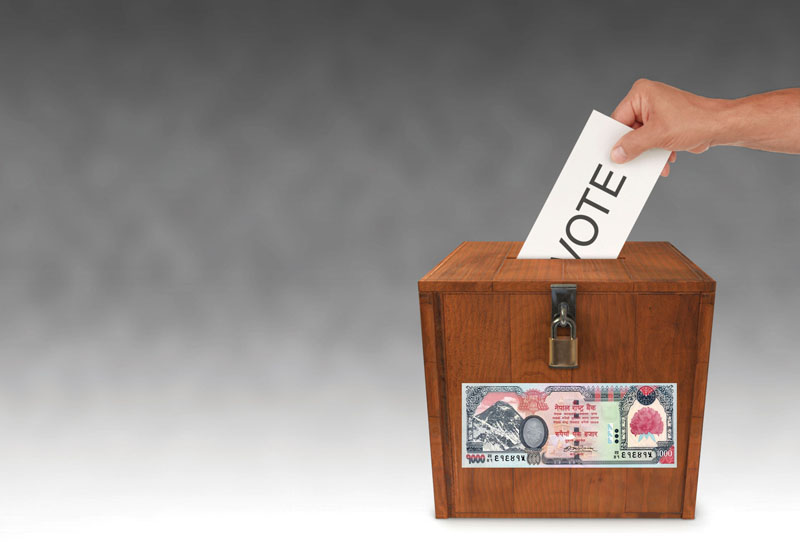
OR

More from Author
The issue of electoral financing has been a hot topic of late. It deals with the cost of election and its subsequent impact on democracy, and is also related to political corruption and values of democracy: issues of transparency and accountability in particular.
Nepali political parties are often blamed for not revealing their actual election costs. This lack of financial transparency is responsible for ‘democracy deficit’ in the parties.
This has been an ongoing debate in Nepal since the 1990 political change and yet there have been no substantive initiatives to make parties more financially transparent and accountable. In this article I argue that this is due to policy deficit.
The Political Party Regulation 2017 obliges political parties to disclose the source of their funding if they receive Rs 100,000 or more. The regulation further says that the party should show the source of money, formal registration in tax office and tax clearance of the funding person or organization. This indicates that there is no place for informal funding such as donation of rice, fuel and other materials, unlike what we have seen during recent election campaigns. Also, the policy does not recognize funding of less than Rs 100,000.
The limit of electoral cost determined by the Election Commission for mayor and deputy mayor for metropolitan city is Rs 750,000; and it is Rs 300,000 each for ward chair, women member, Dalit member and member (open). Similarly, for sub-metropolitan city mayor and deputy mayor, the election cost cap is Rs 550,000; and it is Rs 250,000 each for ward chair, women member, Dalit women member and member (open). Interestingly, costs associated with fuel, meetings, seminars and public events are not considered election expenditure, which represents a big loophole.
The policy deficit on electoral financing has fostered clientelism. Patron-client relation is reciprocal: the stronger the clientelism the higher the probability to get funding. Also, politicians who have been in power for long can benefit more compared to those who have been in power for shorter periods.
Clientelism seems beneficial for winning election but it ultimately undermines institutionalization of political parties. It also hinders establishment of horizontal links based on common interests. Clientelism encourages rent-seeking, for instance mobilization of youth gangs during election. It also disadvantages women candidate because they do not have equal access to financial resources. And most importantly, as few women are in positions of power, they cannot influence party cadres in their favor.
Informal funding promotes family and personal accountability and undermines public accountability. For instance, an elected candidate who wins on the basis of money and muscle will be more accountable to those who helped them win rather than to the electorate. Informal funding also creates problems with transparency. For example, if someone makes a big donation of rice in a feast organized for party cadres, legally neither the donor not the party is obliged to keep records.
In patron-client relation, patron must show and maintain some stature. Organizing feasts is one example of an effort to maintain patron-client relationship. But donations for such feasts are not recorded.
The electoral regulation does not oblige parties to record funding of less than Rs 100,000 and election costs are mostly covered through informal funding. Since such informal funding mechanisms are quite common in rural areas, failure to cover it in electoral laws is a case of serious oversight.
I believe our electoral laws should reflect the realities of Nepali society rather than some hoped for ideal. Only then will we have truly free and fair elections.
The author is a PhD candidate at the Graduate School for Social Research at the Institute of Philosophy and Sociology of the Polish Academy of Sciences
You May Like This

Many breast cancer patients can skip chemo, big study finds
CHICAGO, June 4: Most women with the most common form of early-stage breast cancer can safely skip chemotherapy without hurting their... Read More...

57 dead in central Portugal wildfires; many killed in cars
AVELAR, June 18: Raging forest fires in central Portugal killed at least 57 people, many of them trapped in their... Read More...

Landslides threaten many settlements across Pyuthan
PYUTHAN, Aug 9: Landslides are quite common in Pyuthan. Over the last two and half decades, they have claimed many human... Read More...





Just In
- MoHP cautions docs working in govt hospitals not to work in private ones
- Over 400,000 tourists visited Mustang by road last year
- 19 hydropower projects to be showcased at investment summit
- Global oil and gold prices surge as Israel retaliates against Iran
- Sajha Yatayat cancels CEO appointment process for lack of candidates
- Govt padlocks Nepal Scouts’ property illegally occupied by NC lawmaker Deepak Khadka
- FWEAN meets with President Paudel to solicit support for women entrepreneurship
- Koshi provincial assembly passes resolution motion calling for special session by majority votes






_20220508065243.jpg)






Leave A Comment